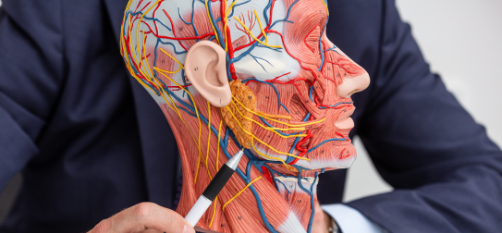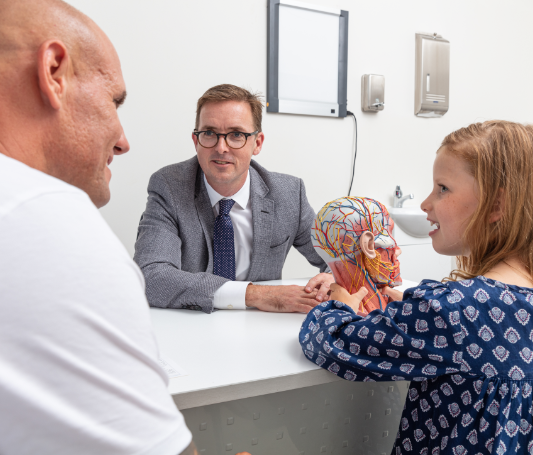SALIVARY GLAND DISEASE
Parotid Diseases
Your parotid glands are the largest salivary glands, and are located on either side of your face just in front of your ears. Your parotid glands produce a watery secretion called serous saliva, which accounts for most of the saliva your body produces while you are eating.
What conditions could affect my parotid glands?
Both localised conditions and systemic illness could affect your parotid glands. Parotid gland problems include:


Sialadenitis
Sialadenitis is inflammation of the salivary glands. Acute sialadenitis (or parotitis) commonly affects the parotid gland. If a patient is dehydrated, or eating less than usual, bacteria may migrate from the mouth into the parotid gland, causing an infection. Bacterial parotitis is treated with gland massage and antibiotics. If there is an abscess, surgical drainage is occasionally required.
In some cases sialadenitis symptoms can be more long lasting with intermittent episodes of pain, swelling, and infection of the parotid glands. This can be caused by scarring within the drainage tube, or duct, called stenosis. The parotid glands can also be affected by autoimmune diseases such as Sjögren’s syndrome which can cause pain and swelling of the glands. Eventually the damage caused to the salivary glands causes a lack of saliva, Xerostomia.
The underlying cause may require treatment, and supportive measures may improve symptoms. Occasionally, chronic sialadenitis is treated by surgical removal of the affected gland and Dr McGuinness will be able to advise you if this is necessary and provide details of the surgery.
Other parotid gland infections
Various viral infections may target the parotid gland. Mumps infection causes painful parotid swelling. (Thankfully, mumps is far less common these days due to widespread vaccination.)
Patients with HIV often have chronically enlarged parotid glands. The most important treatment for these patients is anti-retroviral medication.
Cat-scratch disease is a bacterial infection commonly seen in children who are exposed to cats. It affects the lymph nodes of the neck, and sometimes lymph glands within the parotids. Cat-scratch disease usually resolves on its own but may require antibiotics.
Recurrent parotitis of childhood
This condition causes recurrent episodes of pain and swelling of the parotids. During an episode, (which could occur every few months), a child experiences tender swelling of one or both parotid glands and might feel generally unwell. Dr McGuinness is able to provide supportive care during these flare-ups. Although the cause for this disorder is unknown, recurrent parotitis of childhood usually resolves on its own by the time a child reaches puberty.
Parotid Tumours
Around 80% of all salivary gland tumours occur in the parotid. Fortunately, most primary parotid tumours are non-cancerous. The most common benign parotid tumour is called a pleomorphic adenoma. However, in Australia our high levels of skin cancer mean that quite often in older patients a lump found in the parotid gland is actually a cancerous lymph node.
A pleomorphic adenoma usually develops slowly and is first noticed as a painless lump. Often after a number of years these benign tumours may turn malignant. For this reason it is generally recommended that tumours in the parotid gland are removed with surgery. Surgery is usually curative and recurrence is exceedingly rare.

Aside form skin cancer, metastasis malignant tumours of the parotid gland itself are much less common. They tend to occur in older adults, and may be linked with previous radiation, Sjögren’s disease and possibly smoking. Sometimes, cancer from another site may spread to the parotid gland. The prognosis of salivary gland cancers depends on the type of tumour and its stage. Nearly all of these types of malignant parotid tumour will require surgery to remove the tumour, often along with surgery to remove lymph nodes from the neck (a neck dissection). Malignant parotid tumours will also generally require radiotherapy after completion of surgery. On average, around 70% of people with salivary gland cancer are still living five years after diagnosis.
Dr McGuinness is an expert in the diagnosis, management and treatment of salivary gland conditions and is able to assist you with both medical and surgical treatment, as required.
